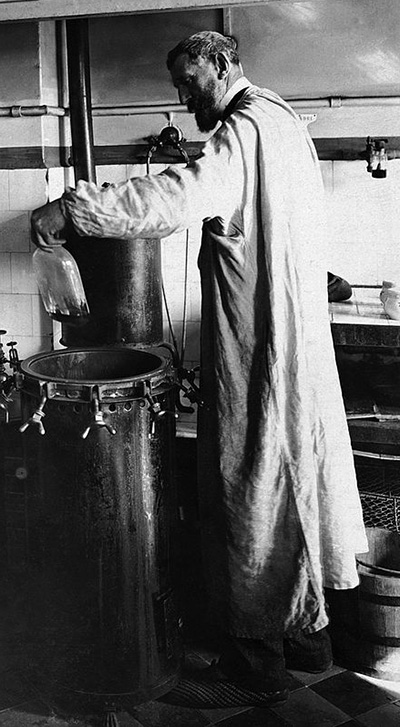My dear brothers and sisters in the Lord,
In my column at the beginning of Lent, I suggested that getting our vaccination against the COVID-19 virus would be a good practice for us during Lent. Given the difficulty of receiving the vaccine and the skepticism of some about being inoculated, I write this article.
Perhaps history can help us in this regard by concentrating on the person of Louis Pasteur, who was born in France in 1822 to a poor Catholic family. He was a biologist, microbiologist, and chemist who developed the principle of vaccination and the beginning of humanology. Pasteur began with the most famous work he accomplished, which is known as pasteurization. He observed that some who drank the milk of cows developed Tuberculosis. In his experiments, Pasteur recognized that heating the cow’s milk to 130 degrees killed the microbes. This led to his understanding that the microbial origin of disease affected many farm animals in those days.
His work began with the inoculation of chickens and then sheep and rabbits. In each one of these experiments, Pasteur discovered that immunology began with killing whatever microbe was present, and then he transferred his knowledge to the existence of viruses. He understood that by weakening its strength, and then by reinjecting that microbe into the body, immunity against the microbe was gained. An English doctor and scientist, Dr. Edward Jenner, is credited with pioneering the concept of vaccines; however, Louis Pasteur is credited with discovering vaccinations.

And here is the problem that we have today. Many people are skeptical in general about vaccines for many, many reasons. For some, it is a medical reason that they do not believe that injection with weakened microbes or viruses is healthy. Some believe that a vaccine can cause even greater damage to the body. Others see a moral issue because several generations ago, aborted fetuses were used to begin what is called “cell lines,” used today in the beginning work of creating new vaccines.
Although now in the new production of vaccines, a genetic profile is followed, which enables many of these vaccines to be produced without recourse to long aborted cell lines. Some vaccines today are free from this, while others still use the older technology. The Holy See, however, has reminded us that the proximity of abortion to the use in vaccines is completely moral since there is no direct effect.
Others might dispute this; however, besides our own fear of inoculation in general, there are no moral issues that would keep us from getting vaccinated in the course of this pandemic. The vaccine protects us and others from spreading this COVID-19 virus.
Returning to the wisdom of Louis Pasteur, we know he once said, “There are no such things as applied sciences, only applications of science.” It seems that science has become a new religion, something that is more mysterious than religion and must be venerated more than religion itself. It is so true that the perceived gap between religion and science has been artificially created.
For example, Louis Pasteur was a genuine man of faith and science. He maintained his faith, even in a secularized France of that time after the French Revolution. He once said, “Happy the man who bears within him a divinity, an ideal of beauty and obeys it; an ideal of art, an ideal of science, an ideal of country, and ideal of the virtues of the Gospel.” Pasteur was a man who was not afraid to share his faith and his science, sometimes at risk to himself. When he discovered the cure to Rabies, he took his own life in his hands by injecting a boy dying of Rabies with his experimental vaccine.
This was against the rules of the time since Pasteur was not a medical doctor, but rather he was a biologist and chemist. The life of that boy was saved because of the courage of Louis Pasteur, and the lives of countless others ever since. One anecdote about his life to show his faith: one time Pasteur was traveling on a train, and he took out his Rosary and began to pray. Across from him sat a young man who began to ridicule him by saying, “Old man, why are you relying on these Medieval charms? Why are you saying the Rosary?” Pasteur never responded to the young man. However, when he got up to leave the train, the young man was still sitting across from him. He handed him his card that simply read, Louis Pasteur. Obviously, the young man learned a lesson that he would not soon forget.
Hopefully, we too can learn lessons that we should not forget regarding science and religion. They are completely compatible when there is good science and good religion. I urge you to take the opportunity to get immunized against COVID-19. Especially those with underlying co-morbidities. I, myself, have received both injections of the Pfizer vaccine. I realize it is difficult to obtain an appointment for a vaccination; however, it is a good Lenten penance to keep trying to obtain one, for your own sake and for the sake of those around you. We know a few people who cannot tolerate any type of immunization; however, this should be the decision of your own doctor.
During this time of COVID-19, we are asked to make many sacrifices. We must daily put out into the deep by finding new ways to cope with disruption in our normal lifestyle. It is never easy to change our habits and customs; however, sometimes, it becomes important to do so. This is one of those times when we begin Lent with a new slate. We need now to write new ways in our hearts of finding our ways to honor God and express our support for good science in the world today.
Follow Bishop DiMarzio on Twitter @BpDiMarzio
facebook.com/bishopdimarzio
